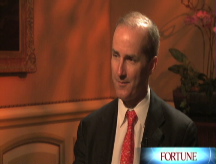Oil executives face House lawmakers
After a Senate grilling, executives from the nation's largest oil companies take more congressional heat on fuel prices.
NEW YORK (CNNMoney.com) -- The debate over who is to blame for high gas prices continued on Capitol Hill Thursday as executives from the nation's largest oil companies returned to face more questions from House lawmakers.
The House Judiciary Committee's Task Force on Competition Policy and Antitrust Laws held a hearing to investigate competition in the oil industry on the day crude topped $135 a barrel for the first time. The Task Force heard testimony from the top brass of ExxonMobil Corp. (XOM, Fortune 500), ConocoPhillips Co. (COP, Fortune 500), Shell Oil Co. (RDS.A), Chevron Corp. (CVX, Fortune 500) and BP (BP).
"This record runup in prices threatens grave economic damage to the U.S. and the world economy, and will no doubt have life or death consequences for many of the world's most impoverished peoples," Rep. John Conyers, D-Mich., who chairs the Task Force, said in prepared remarks.
Senate lawmakers grilled the same executives Wednesday, pressing them to justify how their companies can make enormous profits while American households struggle with high gas prices.
Partisan tone: Thursday's hearing took a partisan tone even before the executives testified.
In opening remarks, House Republicans argued that Congress has "locked up" the nation's oil reserves by preventing oil companies from drilling domestically in environmentally sensitive areas.
Steve Chabot, R-Ohio, said these policies have forced America to depend on foreign imports and to "rely on the mood of third-world dictators" and the "choppy waters of OPEC."
"Democrats have interfered continuously against our efforts to bring down gas prices," said Rep. Chris Cannon, R-Utah. "The availability of oil is vast," he said. Congress should "get out of the way of industry and let them get on with producing oil."
Cannon also remarked that the issue of high gas prices is complicated and that he is "not sure Americans understand it."
That comment prompted a sharp reply from Rep. Debbie Wasserman-Schultz, D-Fla., who said "it is that kind of patronizing attitude that has shaken Americans' confidence in their government."
Congress has given the oil industry "more permits than it know what to do with," Wasserman-Schultz said. "We're not tying their hands," she added.
Economic factors. The executives said fundamental economic factors beyond their control are driving oil and gas prices higher.
Strong demand from developing countries, a weak dollar, high input costs, speculative investment, stiff global competition and geopolitical issues are all driving oil prices, they said.
"We alone can't change the conditions that brought us here. Energy companies, policymakers and consumers all have a role to play in creating a new energy future for the U.S.," Robert Malone, president of BP America, said in prepared testimony for Thursday.
American oil companies compete in a "vast global market place," where large, government-owned oil companies with nationalized resources "dominate the top spots," J. Stephen Simon, senior vice president of ExxonMobil told lawmakers.
As the price of crude has surged and U.S. oil companies have been denied access to domestic reserves, refiners have been forced to pass on higher input costs to consumers, he said.
Refinery capacity. Democratic lawmakers questioned whether the oil companies have done enough to increase refinery capacity.
"We have an administration that is refusing to do anything to expand the capacity that we have except more and more drilling, and that is not the answer," Wasserman-Schultz said.
Increasing refinery capacity would add more product to the market and would held bring gas prices down. But Democrats argue that oil companies have been reluctant to invest in refinery capacity, which is suggestive of price fixing.
"I can't say that there's evidence that you are manipulating the price, but I believe that you probably are," Rep. Wasserman-Schultz said.
Simon maintained that new refineries are not necessary and that the oil industry has expanded capacity at existing facilities "commensurate with demand."
"The market is working - I know it's painful - but it's working," he said.
Unconscionable profits. Though their profits are high "in absolute terms," Simon said ExxonMobil, and other oil companies, have tight profit margins.
But Rep. Steve Cohen, D-Tenn., argued that oil industry profits are "unconscionable" and that oil companies are "gouging the American public."
In response, the executives said most of their profits are reinvested into their companies to help boost production, which will ultimately puts "downward pressure" on gas prices.
Cohen pointed out that ExxonMobil reported a $40.6 billion profit last year, the largest profit in U.S. history, and the company's former president received a "$400 million retirement package."
Simon disputed the $400 million number and said that executive compensation is determined by an independent board and is comparable to other industries.
Limited access: Opening access to restricted oil resources was a common refrain during the hearing.
To reduce the price of gas, Congress should "commit to the U.S., and people around the world, that we will resolve this issue of restricting supply once and for all," said John Hofmeister, president of Shell.
Showing a willingness to exploit domestic resources would send an important signal and would "knock the futures market on its head," Hofmeister said. In other words, it would discourage traders from bidding up the price of oil based on a perception of tight supplies in the future.
A proposed gas tax holiday, which is aimed at providing temporary relief from high prices, was roundly rejected by the oilmen, who said it would spur demand and exacerbate prices.
Congressional moves: Gas prices have become an increasingly important political issue as the nation's economy slows and family budgets are crimped by the rising cost of driving.
Congress voted overwhelmingly last week to order President Bush to stop deliveries to the nation's Strategic Petroleum Reserve for six months, in an effort to alleviate high gas prices. The House also recently passed a bill that would allow the Justice Department to sue OPEC.
Earlier this month, Senate Democrats called for a temporary windfall profits tax on oil companies and a rollback of $17 billion in oil industry tax breaks as part of an energy package. But the effort met with stiff resistance from Republicans. ![]()





